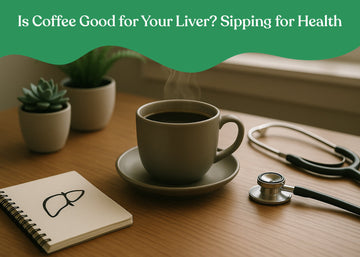Coffee is not just a caffeinated jolt of wake-up juice; it’s a cherished beverage, and we’re always curious to learn whether it’s good for us. Coffee has attracted interest for liver health, in particular from scientists. If you’re currently sipping on a cup of Greenbrrew coffee, idly pondering whether it’s on your liver’s good side or not, then you’ve come to the right place. Let’s delve into the connection between coffee and liver health in a style that’s straightforward, easy to read, and user-friendly.
The Liver: Your Body’s Silent Hero
Before we get into coffee’s effects, let’s first understand the liver’s function. This essential organ is a multitasking superhero, ridding toxins, helping digest and controlling metabolism. But poor diet, alcohol, or certain drugs can cause rough treatment to the liver, resulting in conditions like fatty liver disease, hepatitis or cirrhosis. Can your morning Greenbrrew coffee support this hard-working organ? Let’s find out.
Coffee and Liver Health: What Does Science Say?
-
Reducing the Risk of Liver Diseases
Studies suggest that regular coffee consumption may lower the risk of several liver conditions. Coffee users, for example, had a lower risk of non-alcoholic fatty liver disease (NAFLD), a disorder where fat accumulates in the liver, according to a 2016 meta-analysis published in Alimentary Pharmacology & Therapeutics. Additionally, coffee seems to reduce the development of liver fibrosis, which is a condition that precedes cirrhosis.
-
Protecting Against Liver Cancer
Among the most thrilling discoveries is that coffee may lower the risk of liver cancer. Drinking coffee was linked to a 50 percent lower risk of hepatocellular carcinoma, the most common type of liver cancer, in a 2017 BMJ Open study. The antioxidants and other anti-inflammatory compounds in coffee, such as chlorogenic acid, appear to be the basis for this preventative effect.
-
Supporting Liver Enzyme Levels
Elevated liver enzymes, such as ALT and AST, can signal liver stress or damage. Research shows that coffee drinkers often have lower levels of these enzymes. A 2015 study in Hepatology noted that even decaf coffee provided benefits, suggesting that coffee’s perks go beyond caffeine.
-
Easing Cirrhosis Progression
For those with chronic liver diseases, coffee might offer a glimmer of hope. Studies indicate that drinking two or more cups daily may reduce the risk of developing cirrhosis, a severe scarring of the liver. A 2014 study in Hepatology found that coffee consumption was linked to a lower risk of death from cirrhosis-related causes.
Why Does Coffee Help the Liver?
-
Antioxidants: Coffee is packed with antioxidants like chlorogenic acid and melanoidins, which combat oxidative stress and inflammation in the liver.
-
Caffeine: This stimulant may help reduce fat buildup in the liver, a key factor in NAFLD.
-
Diterpenes: Compounds like cafestol and kahweol, found in unfiltered coffee, have shown anti-inflammatory and anti-cancer properties.
-
Polyphenols: These plant-based compounds support overall liver function by reducing harmful toxins.
How Much Coffee Is Beneficial?
Moderation is key. Most studies suggest that 2–3 cups of coffee per day offer liver benefits without significant risks. However, drinking too much coffee can lead to side effects like jitteriness, insomnia, or increased heart rate, especially for those sensitive to caffeine. Always consult your doctor if you have existing liver conditions or concerns about caffeine intake.
Filtered vs. Unfiltered Coffee
The way coffee is prepared matters. Filtered coffee, like most Greenbrrew brews, removes some diterpenes (cafestol and kahweol), which may raise cholesterol in large amounts. Unfiltered coffee, such as French press or espresso, retains these compounds, which could benefit the liver, but should be consumed in moderation.
Who Should Be Cautious?
-
Pregnant women: High caffeine intake may pose risks during pregnancy.
-
People with anxiety or heart conditions: Caffeine can exacerbate these issues.
-
Those on specific medications: Coffee can interact with certain drugs, so check with your healthcare provider.
Adding Coffee to a Liver-Healthy Lifestyle
-
Eat a balanced diet: Focus on fruits, vegetables, whole grains, and lean proteins.
-
Limit alcohol: Excessive drinking is a major cause of liver damage.
-
Stay active: Regular exercise helps reduce liver fat and supports overall health.
-
Avoid processed foods: High sugar and trans fats can contribute to fatty liver disease.
Conclusion
In moderation, coffee appears to be a liver-loving beverage with the potential to reduce the risk of liver diseases, support healthy enzyme levels, and even protect against liver cancer. The antioxidants, caffeine, and other compounds in Greenbrrew coffee work together to give your liver a helping hand. However, balance is crucial—stick to 2–3 cups daily, choose filtered coffee when possible, and complement your coffee habit with a healthy lifestyle. If you’re a coffee enthusiast, you can feel good knowing that your favorite brew might just be doing your liver some good. Always consult a healthcare professional for personalized advice, especially if you have liver concerns.
FAQ's
Q1. Is coffee good or bad for the liver?
Ans. In moderation, coffee is beneficial to the liver! According to studies, the antioxidants in 1-2 cups per day may reduce the incidence of liver disease. However, consuming too much caffeine might cause stress to your body, so avoid doing so.
Q2. How do I clean my liver?
Ans. Stay hydrated, eat plenty of vegetables, and limit your sugar intake. Greenbrrew’s Coffee (1-2 cups) and green tea are good sources of antioxidants. Avoid alcoholic beverages and processed meals. Exercise and sleep well. Chat with a doctor for individualized advice!
Q3. Why does coffee detox the liver?
Ans. Coffee contains antioxidants such as chlorogenic acids, which protect liver cells and prevent inflammation. It may help reduce fat accumulation in the liver. Drinking 1-2 cups per day promotes liver health, but too much might be problematic. Moderation is crucial!



